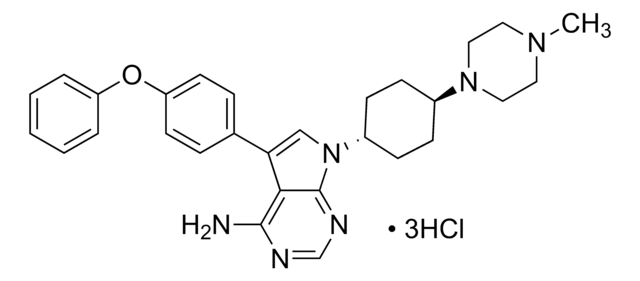SML0314
CGP77675
≥98% (HPLC)
Synonym(s):
1-(2-{4-[4-Amino-5-(3-methoxyphenyl)-7H-pyrrolo[2,3-d]pyrimidin-7-yl]phenyl}ethyl)piperidin-4-ol, 1-(4-(4-Amino-5-(3-methoxyphenyl)-7H-pyrrolo[2,3-d]pyrimidin-7-yl)phenethyl)piperidin-4-ol, CGP 77675, CGP-77675
About This Item
Recommended Products
Quality Level
Assay
≥98% (HPLC)
form
powder
color
white to beige
solubility
DMSO: >10 mg/mL
storage temp.
2-8°C
SMILES string
COc1cccc(c1)-c2cn(-c3ccc(CCN4CCC(O)CC4)cc3)c5ncnc(N)c25
InChI
1S/C26H29N5O2/c1-33-22-4-2-3-19(15-22)23-16-31(26-24(23)25(27)28-17-29-26)20-7-5-18(6-8-20)9-12-30-13-10-21(32)11-14-30/h2-8,15-17,21,32H,9-14H2,1H3,(H2,27,28,29)
InChI key
WUPXZZWTHIZICK-UHFFFAOYSA-N
General description
Application
Biochem/physiol Actions
Features and Benefits
Storage Class Code
11 - Combustible Solids
WGK
WGK 3
Flash Point(F)
Not applicable
Flash Point(C)
Not applicable
Certificates of Analysis (COA)
Search for Certificates of Analysis (COA) by entering the products Lot/Batch Number. Lot and Batch Numbers can be found on a product’s label following the words ‘Lot’ or ‘Batch’.
Already Own This Product?
Find documentation for the products that you have recently purchased in the Document Library.
Articles
Src is the original member of a group of non-receptor protein-tyrosine kinases termed the Src family kinases (SFKs). Learn about the SFKs that, in humans, consist of eight members, a small group of atypical members, and two related kinases.
Src is the original member of a group of non-receptor protein-tyrosine kinases termed the Src family kinases (SFKs). Learn about the SFKs that, in humans, consist of eight members, a small group of atypical members, and two related kinases.
Src is the original member of a group of non-receptor protein-tyrosine kinases termed the Src family kinases (SFKs). Learn about the SFKs that, in humans, consist of eight members, a small group of atypical members, and two related kinases.
Src is the original member of a group of non-receptor protein-tyrosine kinases termed the Src family kinases (SFKs). Learn about the SFKs that, in humans, consist of eight members, a small group of atypical members, and two related kinases.
Our team of scientists has experience in all areas of research including Life Science, Material Science, Chemical Synthesis, Chromatography, Analytical and many others.
Contact Technical Service








